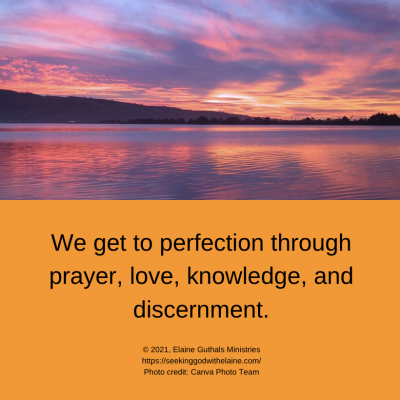We are on the Sanctification Road to become more like God. Beginning a study on thoughts and meditation, this daily devotional looks at studying Scripture and returning to our first love.
Nuggets
- Studying the Scriptures cleanses bad thoughts.
- We cleanse our thoughts when return to having a strong relationship with God.
To read devotions in the Redo for Godliness series, click the appropriate button below.
Devotions in the How Do We Live Godly Lives? series
How Do We Use Our Thoughts through Meditation?
How Do We Prevent Bad Thoughts?
How Do We Order Our Evil Thoughts?
How Do We Focus on Good Thoughts?

We’re going to be looking at part of Charnock’s sermon entitled The Sinfulness and Cure of Thoughts. His intent was to show us how to cleanse, a.k.a. sanctify, our thought processes. He described our thoughts as the “… inward operations of the souls of men …”
I love how Charnock described how described what happened when Satan tempted Adam and Eve. He wrote, “Original corruption stuffs us with bad thoughts …”
Resource
That made me laugh. It also made me feel like a Thanksgiving turkey.
Let’s start off by seeing how Charnock suggested we cleanse those bad thoughts.
Studying Scripture
“And it is my prayer that your love may abound more and more, with knowledge and all discernment so that you may approve what is excellent, and so be pure and blameless for the day of Christ” (Phil. 1: 9-10 ESV)
Studying the Scriptures cleanses the bad thoughts.
Let’s address the last verse first. We are doing the redo for godliness so that we can improve. That improvement equates to successfully completing the Sanctification Road.
Our goal is to be “… pure and blameless for the day of Christ” (Phil. 1: 10 ESV). That will lead to perfection.
We get to perfection through prayer, love, knowledge, and discernment. Charnock focused on the knowledge part of the verse. He zeroed in on studying the Scriptures. Still, the knowledge increases our prayer, love, and discernment.

Let’s focus on the knowledge and love. The two are linked together. Knowledge is needed to grow love.
That being said, Liddon wrote, “He [Paul] does not pray that their knowledge may abound more and more in love. Whenever knowledge and love are put in competition, the precedence is always given to love. As compared with knowledge love is intrinsically stronger, and worth more practically.”
Resource
Liddon argued that thought must also be linked with love and knowledge. Gordon agreed. He wrote, “Knowledge reveals character and character draws out love.”
Resource
Isn’t it true that we lack knowledge of the Scriptures? I know for years I didn’t study them like I should have. We don’t give reading them the priority we should. That doesn’t even address studying them and meditating on them.
Knowledge supplies the foundation for love. We can’t love something about which we know nothing.
Emmons reminded us that this won’t be perfect knowledge. We aren’t God. God isn’t going to tell us everything. Some of what He tells us, we aren’t going to understand.
But Emmons had it right. We have to love the True God. We can’t say we love God because He gives a pass to sinners. Sinners are all people who have not made a genuine profession of faith — who have not sincerely ABCDed.
The ABCDs of Salvation
If you have not become a believer in Christ, please read through the
Plan of Salvation and prayerfully consider what God is asking you to do.
A – admit our sins
B – believe His Son Jesus is our Redeemer
C – confess God as Sovereign Lord
D – demonstrate that commitment by making any changes needed in our lives to
live the way in which God has called us
The Disciple’s Job Description
God really doesn’t overlook sin. He gives a pass to sinners who repent. Repentance is acknowledging our separation from God and expressing sorrow for breaking God’s laws and commandments by making the commitment to changing ourselves through obedience so that we no longer do the wrong things.
Resource
It is clear that, in order to know God, we have to search for Him and seek Him. It can’t be a halfhearted encounter.
Searching for and Seeking God
Hearing His Word (Rom. 10: 17).
Reading His Word (Rev. 1: 3).
Praying to Him (Heb. 4: 16).
Studying His Word (Ac. 17: 11).
Meditating on His Word (Ps. 1: 1-2).
Memorizing His Word (Ps. 119: 11).
We must delve into the Scriptures to find the many facets of the Sovereign God. We do that not only by hearing and reading His Word, but by studying it, meditating on it, and memorizing it.
We must bathe all of that with prayer. Prayer is a two-way communication with God in which we pour out our soul to Him. It is only through this direct communication do we truly come into contact with our Heavenly Father.
Returning to Our First Love
“But I have this against you, that you have abandoned the love you had at first” (Rev. 2: 4 ESV)
We cleanse our thoughts when return to having a strong relationship with God.
We’ve talked about falling away from our first love before. Jesus accused the Church of Ephesus of doing this.
To read a devotion in the First Love series, click on the appropriate button below.
We’ve considered about this overall. However, we did not look at this through the lens of losing our first love through our frame of mind. Let’s see what we can see.
“Reflect often upon the frame of your mind at your first conversion. None have more settled and more pleasant thoughts of Divine things than new converts when they first clasp about Christ, partly because of the novelty of their state, and partly because God puts a full stock into them; and diligent tradesmen at their first setting up, have their minds intent upon improving their stock. Endeavour to put your mind in the same posture it was then” (Charnock, The Sinfulness and Cure of Thoughts)
Our thoughts play a role in salvation and returning us to our first love.
Let’s start with a review. Our faith begins in our mind. Jay wrote, “All religion commences in serious thought. There is nothing more useful than self-recollection; there is no means better for reviving the soul than a review of former experiences.”
Resource
That is where it starts before we get it to the heart level. However, thoughts continue to play a role.
Mitchell argued that it is difficult to identify when disciples have lost their first love. He wrote, “The soul itself is perhaps hardly conscious of it. Or if conscious of anything, it is that prayer is not so easy and pleasant as it used to be, that the thoughts are more wandering, that temptation is more attractive, and thanksgiving is irksome, unreal, and unblessed. The whole tendency of our being is to deteriorate.”
Resource
Oh, yeah. Those wandering thoughts get us every time.
But these thoughts also help us, don’t they? They are how we evaluate ourselves.
If our thoughts are wandering all over kingdom come, it is harder to corral them to take an in-depth assessment of how things really are. We either don’t start or give up before we get ours reconciled with God.
Unfortunately, Aitken called it right when he said that many times we lose our first love through thoughtlessness. That makes sense when we tie it to what Bushnell says about “… the heavenly in feeling [becoming] the heavenly in choice, thought, judgment, and habit …”
Resource
God gives us the choice of whether or not we are going to follow Him. It is called free will. Free will is the ability within us to make decisions, which determine actions that produce character.
That choice means God is not a dictator. He does not force us to do His Will.
But that also makes us to choose daily whether we are going to follow Him. “This Book of the Law shall not depart from your mouth, but you shall meditate on it day and night, so that you may be careful to do according to all that is written in it. For then you will make your way prosperous, and then you will have good success (Josh. 1: 8 ESV).
What is meditate? It is to think about it, reflect on it, deliberate and engage in it. (We will look at it more in depth in the next devotion.)
Doing all of that is what is needed to reconcile us with God. That shows us where our relationships with God is out of kilter and what we need to do to fix them.

Making the Connections
Spring described holiness as obedience to the truth. Wow! I like that.
Resource
- Holiness is the transcendent excellence of His nature that includes elements of purity, dedication, and commitment that lead to being set apart.
- Purity means possessing God’s moral character, having eliminated the stain of sin.
- Obedience means to hear, conform to, and carry out the instructions that God gives us.
• God’s truth is faithfulness that leads to godliness.
The best way to gain knowledge is to experience something. The best way to know God is to experience His love and grace.
How Do We Apply This?
- We cleanse our thoughts by focusing on God.
- We have to reflect God’s love, not just worldly love.
- We should study God’s perfections and attributes, the mystery of the gospel, and Christ’s teachings.
Resource
Father God. We want to know of You. We want to focus our thoughts on You. Tell us what we need to know and can understand. Amen.
What do you think?
Leave me a comment below (about this or anything else) or head over to my Facebook group for some interactive discussion.
If you don’t understand something and would like further clarification, please contact me.
If you have not signed up for the email daily or weekly providing the link to the devotions and the newsletter, do so below.
If God has used this devotion to speak with you, consider sharing it on social media.